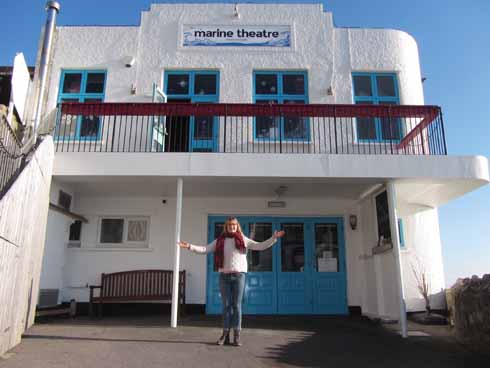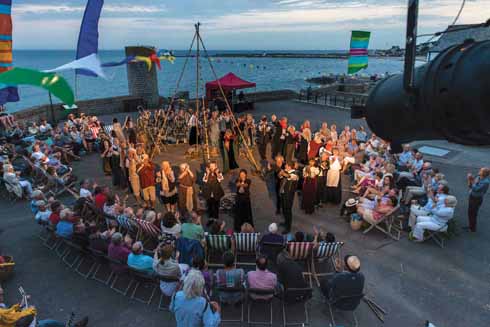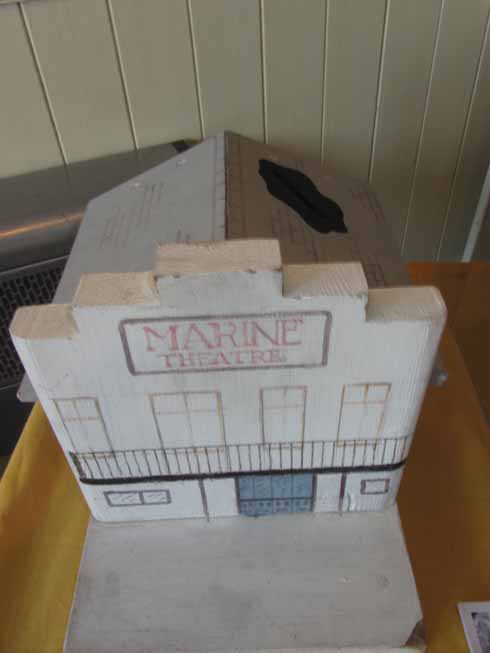Super Marine Theatre
John Heighway succumbs to the lure of the Lyme light at the town's 123-year-old theatre
Published in February ’17
With a suitably dramatic perch by the Gun Cliff pumping station above the rock armour that protects the promenade at Lyme Regis, the 123-year-old Marine Theatre – aptly known as the ‘little theatre by the sea’ – is no mystery to the 20,000 or more visitors that have seen shows there this year, but according to its Artistic Director Clemmie Reynolds it may still be news to some.
‘I was amazed to hear from a school that had only just found out about us,’ she says. ‘They’d wanted to bring students to see the incredible Told By An Idiot theatre company, looked on its website and seen us listed; got in touch and we were able to accommodate them. They loved the show and the theatre.’
Things like that have happened a few times in the 18 months since actor-director Clemmie took up her quite big ‘little job by the sea’ – perfectly fittingly as it turns out.
‘I didn’t know anything about Lyme Regis until the spring of 2015, in fact I thought it had been made up by Jane Austen. I was touring in a new play and had a night at Bridport Arts Centre where the landlady of the digs I was staying in recommended coming to Lyme. I came here with another cast member and was bowled over, then we found the Marine Theatre and it was full of actors rehearsing and I just fell head over heels
in love.
‘I knew I had to come back and two weeks after I got home the job came up, I applied and got it. Two months later I moved here and haven’t stopped since.’
Subscribing to an ethos of evolution rather than revolution, Clemmie has picked up the baton passed by her predecessors Tim Bell and Harry Long who had jointly held the position since 2011. Under their leadership the Marine began to attract star names from the worlds of comedy and music such as Michael McIntyre, Jo Brand, Ginger Baker and Midge Ure, but crucially it also established a reputation as a producing house for new theatre through its programme ‘R&D By the Sea’ in which companies enjoy rehearsal time at the Marine in return for showing their work before it goes out on tour.
‘We are becoming much better known. Artists who have never been here before will have often heard about us and they always love what they find when they get here, not least because there’s a dressing room with a panoramic view of the bay. Sometimes they even have a dip in the sea before they go on.’
There was a time when they needn’t have gone so far to get wet as for years the Marine struggled with a hole in its roof that meant a paddling pool had to be deployed on the sea side of the auditorium whenever it rained harder than a drizzle. It was finally fixed a year ago following a three-year fundraising campaign with significant grants from the Coastal Communities Fund and the Department for Communities and Local Government.
As it is with all such venues, funding is an on-going battle. West Dorset District Council has cut its grant and although Lyme Regis Town Council continues to support the theatre funding is decreased every year. Successful grant applications have been made to Arts Council England and the theatre’s volunteer fundraising committee brings in a steady income.
However, the ‘little’ theatre has big plans and aims to join the Arts Council’s 663 National Portfolio Organisations that benefit from core funding. For that to happen not only must the theatre continue to demonstrate its artistic prowess and community importance, but the organisation must be on a sound business footing with room to grow for the benefit of the town and wider region. So, as well as increasing the number of shows from 100 in 2014-15 to more than 250 this year, there is a £250,000 refurbishment plan.
‘We had 7,000 visitors in 2014-15 and by the end of this financial year we’ll have welcomed closer to 25,000, maybe more,’ says Clemmie. ‘Putting on more shows means our turnover will grow exponentially and although I’m still the only full-time member of staff I’ve been able to engage more people for more hours in specific roles, as well as manage our 60 volunteers who are absolutely wonderful and we couldn’t open without them.
‘But I’m a theatre maker so my background is in directing and acting, managing people, that’s what I do. What I’d not done before is be responsible for a building and that has been an incredibly steep learning curve. The theatre space holds 220 people in seats and that won’t change a great deal but what we can do is extend the foyer out, build a new box office and bring the café to the front of the building so it can be open all day.
‘It is already being run as a separate business and I’d like to extend the bar and do the same with that, especially if we get floor to ceiling glass walls overlooking the sea. I’m hopeful it will happen this year [2017] – nothing is impossible.’
The site has been an important community asset ever since the first building on it opened in 1806 as Davies’s Baths to house curative seawater baths, the first of their kind in Lyme Regis, and a reading room. Today, all that remains of the Georgian baths are the pump house, which makes up one of the dressing rooms, and the cellar – earmarked as the possible Sub-Marine Bar.
Under several owners and despite the apparent discovery of a saline spring (most likely a leak in the sea wall) the baths’ fortunes faded over the years and in 1894 the Drill Hall was built and leased to the 1st Dorset Volunteer Artillery. The stage was an essential part of the design and when the Volunteers disbanded after World War 1 the Drill Hall Theatre was let for touring and local productions as well as film presentations, being renamed the Marine Cinema in the late 1930s as the modern, Art Deco-influenced façade was created.
During World War 2 American troops billeted in and around Lyme Regis used the building as a canteen where they were visited by film star James Cagney and boxer Joe Louis in the weeks before the Normandy Landings. Having been bought by the town council in 1960 the Marine Theatre was renovated and eventually handed over to the Lyme Arts Community Trust in 2003. Recently installed as chair Nigel Clegg is recruiting an entirely new Board of Trustees.
‘One of the things the Board is looking at is expanding corporate sponsorship seeking out new commercial partners for the theatre that will help us shore up our financial footing,’ says Clemmie.
A story persists in Lyme Regis that the Marine Theatre is to be razed and the site sold to make way for flats. It isn’t.
‘I can’t understand why that story keeps coming up because who would benefit? At the moment we have a community facility that provides entertainment and a meeting place for the people of Lyme Regis – some of our amateur companies have met here since the 1920s and members have photographs of their grandparents in shows from back then, it’s quite amazing.
‘But Lyme is fairly small in the winter, about 3000 people, so we have to look further afield for audiences and present diverse shows that encourage people to travel, which they are doing. When they come here they spend money in restaurants, pubs, shops and hotels, so we are of economic benefit to the town. Why people want to talk about us being pulled down is beyond me.’
Politicking aside, Clemmie Reynolds still has a busy artistic workload and leads Lyme Youth Theatre that takes part in the National Theatre’s annual Connections festival. Last year’s much-praised community play The Tempest of Lyme was a promenade production adapted from Shakespeare to include the story of George Somers, the Lyme-born naval hero whose shipwreck in 1609 not only inspired the Bard but led to the colonisation of Bermuda.
This year Clemmie is working on a new play with the same writer Andrew Rattenbury, a Lyme Regis native whose credits include EastEnders and Monarch of the Glen, as well as adaptations of classic crime novel The Postman Always Rings Twice and Hardy’s The Return of the Native for the stage. Monmouth will tell the story of the failed attempt to overthrow James II lead by the ill-fated Duke of Monmouth, who landed at Lyme Regis on 11 June 1685.
‘Once again we’ll recruit local amateurs to work with professionals for a promenade performance that will open by the Cobb then wend its way around the town, along Monmouth Street and down to the Marine. Last year’s cast and crew featured about a hundred local people aged eight to eighty and I want this year’s to be even bigger.
‘But it will have a life beyond Lyme as we’ll also work up a stage version of the play with a professional cast that will tour the South-West and take that ‘Made in Lyme’ stamp out into the world. It’ll be fabulous!’
Only a fool would doubt as much.

Coming this summer – Monmouth: The West Country Rebellion, a community play for Lyme Regis directed by Clemmie Reynolds
- Local people of all ages and abilities are being sought to join the cast and crew of Monmouth in July. To find out more email admin@marinetheatre.com.
The Marine is also looking for new Trustees to take the theatre into the next phase of development, particularly those with a background in human resources, legal and arts management. Please email clemmie@marinetheatre.com for more information.






